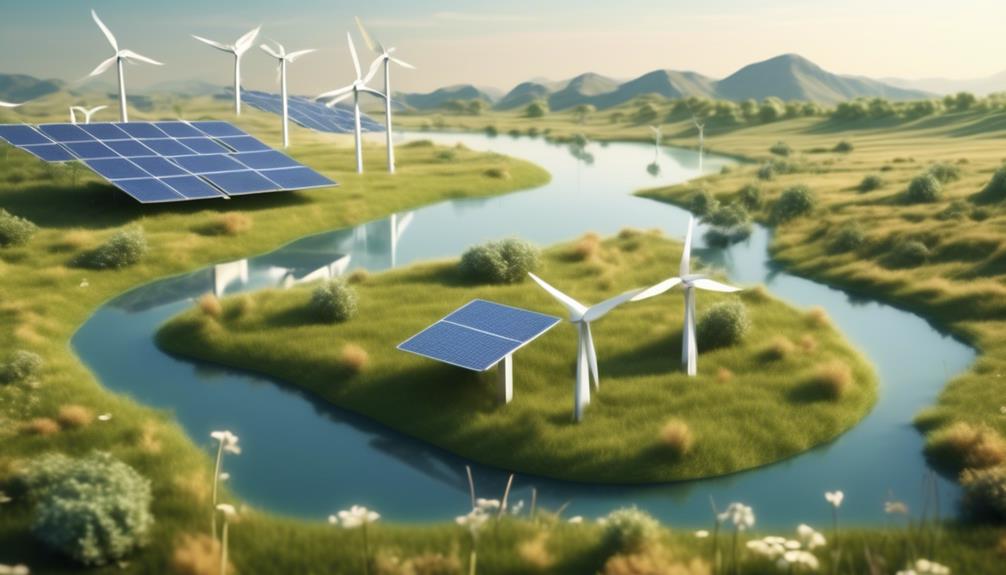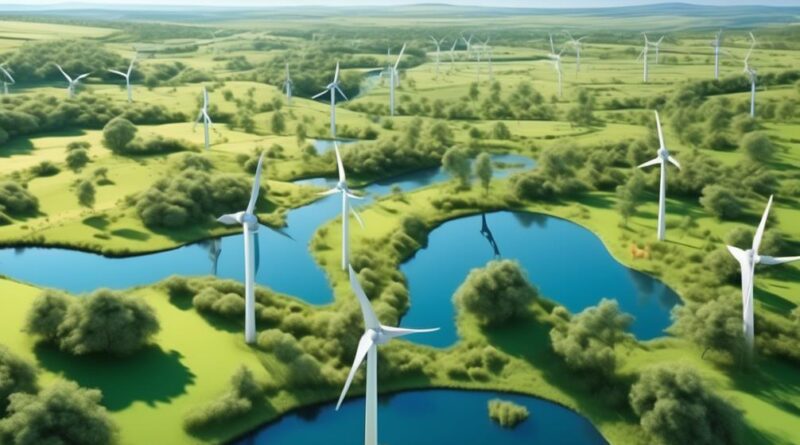What Environmental Benefits Does Renewable Energy Offer?
You've likely heard the adage 'you reap what you sow,' and when it comes to renewable energy, the benefits are indeed bountiful. Not only does it offer a promising solution to combatting climate change, but it also presents a myriad of environmental advantages that are worth exploring.
From the reduction of greenhouse gas emissions to the preservation of ecosystems and wildlife, renewable energy holds the key to addressing some of the most pressing environmental challenges of our time. But there's more to it than meets the eye – the depth of its impact might surprise you.
Reduction in Greenhouse Gas Emissions
By using renewable energy sources, you can significantly reduce greenhouse gas emissions, helping to mitigate climate change. Energy efficiency improvements play a crucial role in this reduction.
When you make the switch to renewable energy, you not only decrease your carbon footprint but also contribute to the overall decrease in greenhouse gas emissions. This is because renewable energy sources such as solar, wind, and hydroelectric power produce little to no greenhouse gases during electricity generation. By embracing energy efficiency improvements alongside renewable energy usage, you can maximize the environmental benefits and play a part in combating climate change.
Furthermore, the adoption of renewable energy sources presents economic opportunities. As the demand for renewable energy technologies grows, so does the need for skilled workers to manufacture, install, and maintain these systems. This creates job opportunities and stimulates economic growth in the renewable energy sector.
In addition, investing in renewable energy can lead to cost savings for both individuals and businesses in the long run. Solar panels, for example, can significantly reduce electricity bills over time. This not only benefits individual consumers but also contributes to a more sustainable and resilient economy.
Minimization of Air Pollution
When you embrace renewable energy sources, you actively contribute to the minimization of air pollution, fostering a healthier environment for all. This has significant health benefits, as reducing air pollution can decrease the risk of respiratory diseases, such as asthma and lung cancer. Furthermore, it can lead to a decrease in hospital admissions and healthcare costs associated with air pollution-related illnesses.
- Health benefits
- By minimizing air pollution through the use of renewable energy, you can help improve air quality, leading to better respiratory health for you and those around you.
- Reduced air pollution means a lower risk of developing respiratory conditions, which can significantly improve the overall well-being and quality of life for communities.
- Economic impact
- Embracing renewable energy sources can have a positive economic impact by reducing the costs associated with health care.
- Decreased air pollution can lead to lower healthcare expenses, as there would be fewer cases of air pollution-related illnesses, resulting in savings for individuals and healthcare systems.
Conservation of Water Resources
Ensuring the conservation of water resources is crucial for sustainable living and preserving the environment for future generations. Renewable energy plays a significant role in water conservation strategies.
Unlike traditional power plants, renewable energy sources such as solar, wind, and hydroelectric power require minimal water for their operation. This reduces the strain on water resources, especially in regions prone to droughts or water scarcity.
Hydropower, a form of renewable energy, has a direct impact on water conservation. By utilizing the natural flow of water to generate electricity, hydropower minimizes water consumption compared to conventional power plants.
Additionally, the use of solar and wind energy for electricity generation eliminates the need for water-intensive cooling processes, further contributing to water conservation efforts.
Implementing renewable energy technologies also helps in reducing pollution, which in turn positively impacts water quality. Fossil fuel-based power plants release pollutants that can contaminate water sources through runoff or air deposition. By transitioning to renewable energy, the overall pollution load on water bodies is decreased, ensuring better water quality for ecosystems and human consumption.
Mitigation of Climate Change Effects
Renewable energy's role in water conservation not only reduces strain on water resources but also contributes to mitigating the effects of climate change. By harnessing energy from sources such as sunlight, wind, and water, renewable energy helps to combat climate change in several ways:
- Renewable energy's impact on weather patterns: The use of renewable energy sources reduces the emission of greenhouse gases, which are major contributors to climate change. By decreasing the amount of greenhouse gases released into the atmosphere, renewable energy can help mitigate extreme weather events such as hurricanes, droughts, and heatwaves. Additionally, the reduction in air pollutants from renewable energy sources can lead to improved air quality, ultimately benefiting weather patterns and reducing the frequency of severe weather events.
- Renewable energy's influence on global temperature trends: The adoption of renewable energy technologies plays a crucial role in curbing the rise in global temperatures. Fossil fuels contribute significantly to the increase in atmospheric carbon dioxide levels, leading to global warming. Renewable energy offers a sustainable alternative, helping to stabilize and potentially lower global temperature trends. This shift can mitigate the impact of rising temperatures on ecosystems, wildlife, and human societies.
- Enhancement of climate resilience: Renewable energy deployment supports the development of resilient infrastructure and energy systems, thereby increasing the ability of communities to adapt to and withstand the impacts of climate change. By diversifying energy sources and reducing reliance on fossil fuels, renewable energy contributes to long-term climate resilience.
Preservation of Ecosystems and Wildlife
The preservation of ecosystems and wildlife is a critical aspect of the environmental benefits associated with renewable energy. Ecosystem preservation is a key component of renewable energy initiatives. By harnessing energy from sources such as sunlight, wind, and water, the need for large-scale land disturbances, such as those caused by mining for fossil fuels, is significantly reduced. This directly contributes to the preservation of diverse ecosystems.
Additionally, the installation of renewable energy infrastructure often involves minimal disruption to the surrounding environment compared to traditional energy sources.
Wildlife protection is another vital aspect. Renewable energy facilities are designed with a focus on minimizing impacts on local wildlife. For instance, wind farms are often strategically located and designed to avoid disrupting migratory bird patterns. Solar farms can be integrated into landscapes in ways that support local flora and fauna.
Furthermore, the reduction in air and water pollution associated with renewable energy helps safeguard the health of wildlife populations.
Decrease in Fossil Fuel Dependency
With renewable energy's focus on minimizing land disturbances and environmental disruption, decreasing our dependency on fossil fuels becomes a natural progression towards a more sustainable energy future. Making this shift offers several benefits for society and the environment:
- Energy security and economic growth: By relying less on fossil fuels, which are subject to price fluctuations and supply chain vulnerabilities, societies can enhance their energy security. Additionally, investing in renewable energy sources can stimulate economic growth by creating new industries and reducing reliance on imported fossil fuels.
- Technological innovation and job creation: Transitioning towards renewable energy requires significant technological innovation, which can drive advancements in various sectors. This, in turn, can create new employment opportunities. The renewable energy industry has the potential to generate a substantial number of jobs, from manufacturing and installation to research and development.
- Environmental and health benefits: Decreasing fossil fuel dependency leads to a reduction in air and water pollution, thereby improving public health and mitigating the impacts of climate change. This shift can also help conserve natural resources and protect ecosystems, contributing to a healthier and more sustainable environment for current and future generations.
Limitation of Land and Water Contamination

To limit land and water contamination, it's crucial to implement stringent regulations and monitoring practices for the storage and disposal of hazardous materials.
Renewable energy sources, such as solar and wind power, can help alleviate the strain on land use and soil fertility caused by traditional energy production. Unlike fossil fuel extraction, renewable energy infrastructure generally requires less land and can often be built on already disturbed or less fertile land. This reduces the pressure to convert natural landscapes for energy production, helping to preserve soil fertility and natural habitats.
In addition to addressing land use concerns, renewable energy can also contribute to the improvement of water quality and the preservation of aquatic habitats. Fossil fuel extraction and combustion can lead to water contamination through leaks, spills, and the release of pollutants into water bodies. Conversely, renewable energy technologies generally have minimal water consumption and lower pollution potential, thereby reducing the risk of contaminating water sources.
Furthermore, the installation of renewable energy infrastructure can create artificial reefs and provide shelter for marine life, contributing positively to aquatic habitats.
Advancement of Sustainable Development
By incorporating renewable energy sources into your development plans, you can actively contribute to the advancement of sustainable practices and minimize the environmental impact of energy production. This proactive approach aligns with the global effort to transition towards environmentally friendly and socially responsible energy solutions.
Here are three ways in which the incorporation of renewable energy supports sustainable development:
- Promoting responsible consumption: Renewable energy sources such as solar, wind, and hydroelectric power promote responsible consumption by offering clean and abundant energy without depleting natural resources. By utilizing these sources, you can reduce reliance on finite resources like fossil fuels, contributing to a more sustainable energy ecosystem.
- Minimizing environmental impact: By integrating renewable energy into your development projects, you can significantly reduce greenhouse gas emissions and air pollution. This, in turn, helps to mitigate climate change and its associated environmental and social impacts, safeguarding the well-being of current and future generations.
- Promoting innovative solutions: Embracing renewable energy encourages the development and adoption of innovative technologies and practices. This fosters a culture of continuous improvement and sustainability, driving the creation of cutting-edge solutions that benefit both the environment and society as a whole.
Frequently Asked Questions
How Does Renewable Energy Impact the Economy and Job Creation?
Renewable energy fuels economic growth by creating diverse employment opportunities. It boosts job creation in manufacturing, construction, and maintenance sectors. This fosters a resilient economy while reducing environmental impact, making it a win-win solution.
What Are the Main Challenges in Implementing Renewable Energy on a Large Scale?
Implementing renewable energy on a large scale presents challenges in scalability and technology integration. These obstacles include grid limitations, storage capacity, and initial investment. Overcoming these hurdles is crucial for a sustainable energy transition.
Are There Any Potential Drawbacks or Limitations to Using Renewable Energy Sources?
When considering renewable energy, potential drawbacks include cost implications and technological limitations. However, continual advancements in technology are addressing these concerns, making renewable energy sources more accessible and cost-effective in the long run.
How Does Renewable Energy Impact Energy Reliability and Resilience?
Renewable energy enhances grid stability and energy security. It reduces power outages and enhances climate resilience. By diversifying energy sources and decentralizing production, renewable energy contributes to a more reliable and resilient energy infrastructure.
What Are the Long-Term Effects of Investing in Renewable Energy on Global Energy Security?
Investing in renewable energy provides long-term benefits for global energy security by reducing reliance on finite resources and promoting environmental sustainability. It enhances energy independence and resilience, contributing to a more secure future.
Conclusion
In conclusion, renewable energy offers a range of environmental benefits, including:
- Reduction of greenhouse gas emissions
- Minimization of air pollution
- Conservation of water resources
- Mitigation of climate change effects
- Preservation of ecosystems and wildlife
- Decrease in fossil fuel dependency
- Limitation of land and water contamination
- Advancement of sustainable development
By utilizing renewable energy sources, you can contribute to a healthier planet and a more sustainable future for generations to come.
